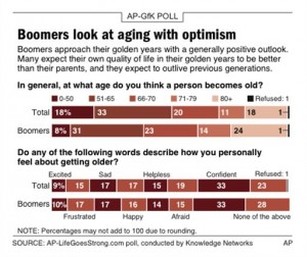The Life of a Boomer
The Baby Boomer generation was the dominant societal force in the last half of the 20th century, and continues that major impact now in the 21st - and not just because of its size.
This is a generation that challenged and significantly changed many things that are now as much a part of our social fabric as Velcro is to the wearable kind....
Things like:
This is a generation that challenged and significantly changed many things that are now as much a part of our social fabric as Velcro is to the wearable kind....
Things like:
- Making sexuality socially acceptable
- Refusing to stay in bad marriages so making divorce/being re-singled a normal thing
- Changing long held bigotries by fighting for equality & welcoming diversity
- Fighting for environmental health, against social injustice, and refusing to automatically respect "authority"(insisting instead that respect for authority must be earned...)
- Rethinking the roll of pharmaceuticals - what started with our love of 'em for fun, parlayed into spearheading research and use of them to both treat & prevent illness at a much lower cost than other options...
- Introducing the concept of "living in the moment" for better clarity and presence, countering what was to us our parents' over-reliance on sacrifice of the present for future benefits
How this Translates to our Lives Today

Some of the ways are clear and well-reported:
Some are less well-known:
- We embrace divorce more than any other generation before or after us
- We readily use pharmaceuticals for improved health outcomes
- We fight age discrimination by redefining the concept of aging as something to welcome, appreciate, and enjoy, not fear; a time to renewal, not of irrelevance or fading away.
- We eschewed saving, replacing it with rampant spending; we became the "me" generation, turning "wants" into "needs"
Some are less well-known:
- HIV & drug addiction among Boomers is dangerously on the rise
- We experience far more "life transitions" than did our parents
- We abandoned many of our youthful ideals of a better world and became "the man" we so reviled at that time, in the beginning of and throughout our working lives out of our determination to get ahead both professionally and materially, and now mostly out of fear that has propelled a contracted world view (Boomers make up 45% of the Tea Party, considered to be the least compassionate and most radical political group in existence today)
- We don't think of ourselves as, and really don't like being called "seniors"
The most urgent of these Boomer Life concerns is the handling of our transitions, for a number of reasons:
- poor handling of them leads to the rise in our divorce, HIV, and addiction rates
- change is scary for anyone, let alone someone in mid-life or beyond; so many changes of such intensity add to our growing fear and lack of compassion
- we are still without parallel when it comes to our generational clout; whether that will be for the better social good and our ability to leave our progeny a better world as our parents did for us, will be determined by what we do over the next 30 years, which will be determined by how happy and fulfilled we are....or not...)
So, for this reason, we dedicate the bulk of this page to advice on Boomer transition best practices, given their key role in Boomer living in general.
Boomer Transitions
As mentioned above, Boomers have carved the path for a number of major changes to social mores and expectations, one among them, and that which has the greatest impact on our lives now, is the number and intensity of life transitions we experience, more than any other generation before us.
This is the result of the changes we created, and now we must figure out how to navigate these transitions successfully, or risk a very poor quality of life.
For instance, our parents had "empty-nest" and retirement. We have:
♦ Empty-Nest
♦ Our Second Act (before known as retirement), which includes major career change or new business ownership
♦ Redefining our marriage to accommodate one or all of the above major changes
♦ Divorce/Single
♦ Newly Married - again/Raising a Newly Blended Family
Here's an overview of each of these transitions and how to handle them...
Boomer Divorce...

In case you've forgotten, this was our theme song on marriage...an incentive to feel comfortable with divorce because we felt pressured to choose the wrong partner in the first place...going against our newly minted grain to not make the same marriage mistakes our parents did....
Boomers have the highest divorce rates of any other generation before or after us.
For those of us over 50, the divorce rate has doubled, according to the National Center for Family & Marriage Research at Bowling Green State University, while over the past 20 years the overall divorce rate has gone down. Translated to hard number, this means 300,000 couples over 50 divorced in 2008, and if the rate stays consistent, that number will balloon to more than 400,000 marriages ended by 2030.
Not surprising to this Boomer Expert, divorce experts chalk the increase up to our affinity for marriage in the first place. According to Krista K. Payne, a data analyst for the center, more of us are on our second and third marriages by the time we hit 50, marriages that are less likely to last.
And Boomer women are becoming far more likely to initiate the divorce than men. According to AARP, the top reasons women cite are “freedom, identity and a need for fulfillment.” Vibrant Nation's Carol Orsborn believes that divorce among Boomers is up because women want to pursue their own interests:
"It isn’t so surprising, really, when you put this into the perspective of how vital we feel at our age…It is highly probable that our mothers (who were) formed in pre-liberation times, felt they had neither the time nor choice to upset the applecart and start fresh. But our generation of women, many of whom worked most of our lives, contributed to or dominated the family income and feel entitled to reinvent ourselves any way we please." (use this link to read the entire article).
Here are some excellent tips on what to think about/prepare for if/when the time comes that you want to divorce, from Boomer Nation! contributing expert, fellow Boomer, and Family Law Attorney Liz Alpert:
For those of us over 50, the divorce rate has doubled, according to the National Center for Family & Marriage Research at Bowling Green State University, while over the past 20 years the overall divorce rate has gone down. Translated to hard number, this means 300,000 couples over 50 divorced in 2008, and if the rate stays consistent, that number will balloon to more than 400,000 marriages ended by 2030.
Not surprising to this Boomer Expert, divorce experts chalk the increase up to our affinity for marriage in the first place. According to Krista K. Payne, a data analyst for the center, more of us are on our second and third marriages by the time we hit 50, marriages that are less likely to last.
And Boomer women are becoming far more likely to initiate the divorce than men. According to AARP, the top reasons women cite are “freedom, identity and a need for fulfillment.” Vibrant Nation's Carol Orsborn believes that divorce among Boomers is up because women want to pursue their own interests:
"It isn’t so surprising, really, when you put this into the perspective of how vital we feel at our age…It is highly probable that our mothers (who were) formed in pre-liberation times, felt they had neither the time nor choice to upset the applecart and start fresh. But our generation of women, many of whom worked most of our lives, contributed to or dominated the family income and feel entitled to reinvent ourselves any way we please." (use this link to read the entire article).
Here are some excellent tips on what to think about/prepare for if/when the time comes that you want to divorce, from Boomer Nation! contributing expert, fellow Boomer, and Family Law Attorney Liz Alpert:
Boomers Who are Single Again...

There are more dating services than there are George's in the Foreman family - many of which are better geared to Gen X'ers than Baby-Boomers. But even when they are inclusive of we 40, 50, & 60 something's, they are not designed to help with the most important foundations from which ultimately the best relationships start & are built - being emotionally healthy, strong, and confident in who we are.
Each of us has experienced this on some level - we know what it looks, sounds, and feels like either personally or when we see it in another. And we all want it - permanently, yet we put the least amount of time and energy into developing and sustaining it. Doesn't make much sense, eh?
What we need to do instead is:
Each of us has experienced this on some level - we know what it looks, sounds, and feels like either personally or when we see it in another. And we all want it - permanently, yet we put the least amount of time and energy into developing and sustaining it. Doesn't make much sense, eh?
What we need to do instead is:
- Discover what you want/need now (the power of intent)
- Develop a healthy & solid personal core
- Learn how to enjoy the dating scene
- Develop your personal style (to attract like-minded people)
Empty Nest...

According to Psychology Today's Diagnosis Dictionary, there is an actual disorder called Empty Nest Syndrome, described as follows:
"Empty Nest Syndrome refers to feelings of depression, sadness, and/or grief experienced by parents and caregivers after children come of age and leave their childhood homes. This may occur when children go to college or get married. Women are more likely than men to be affected; often, when the nest is emptying, mothers are going through other significant life events as well, such as menopause or caring for elderly parents. Yet this doesn't mean that men are completely immune to Empty Nest Syndrome. Men can experience similar feelings of loss regarding the departure of their children."
Although many Boomers may not experience full-blown depression or heart-breaking grief when the last child leaves the proverbial fold, most will experience a demonstrable life change that can become quite disruptive. So, here is an excerpt from "Five Strategies for Dealing with the Empty Nest Syndrome Five Strategies for Dealing with the Empty Nest Syndrome" published on October 7, 2010 by Drs. Charles and Elizabeth Schmitz in Building Great Marriages that work as both prevention of out-of-control feelings resulting from, and a timely intervention for, this life transition:
1. Empty nesters need to take stock of their relationship now that the children are gone. They need to set goals for their relationship, plot a direction they want their marriage to go now and in 5, 10, 15 years down the road.
2. When both husband and wife work outside the home, the great danger for empty nesters is that they plunge their heart and soul into their work as a way of compensating for the absence of children. This will only cause stress in your relationship with your mate.
3. Rekindle the romance and passion of your relationship that is often put on the backburner when you are raising children. Plan for lunch or dinner out. Meet in some clandestine place from time to time for some good old fashion passion.
4. The health of your spouse is of paramount importance to your marriage, especially in the empty nest. The two of you should plan some kind of daily exercise routine.
5. The worst thing you can do to your spouse or yourself as an empty nester is to hover over each other all the time.
(Read the full article)
"Empty Nest Syndrome refers to feelings of depression, sadness, and/or grief experienced by parents and caregivers after children come of age and leave their childhood homes. This may occur when children go to college or get married. Women are more likely than men to be affected; often, when the nest is emptying, mothers are going through other significant life events as well, such as menopause or caring for elderly parents. Yet this doesn't mean that men are completely immune to Empty Nest Syndrome. Men can experience similar feelings of loss regarding the departure of their children."
Although many Boomers may not experience full-blown depression or heart-breaking grief when the last child leaves the proverbial fold, most will experience a demonstrable life change that can become quite disruptive. So, here is an excerpt from "Five Strategies for Dealing with the Empty Nest Syndrome Five Strategies for Dealing with the Empty Nest Syndrome" published on October 7, 2010 by Drs. Charles and Elizabeth Schmitz in Building Great Marriages that work as both prevention of out-of-control feelings resulting from, and a timely intervention for, this life transition:
1. Empty nesters need to take stock of their relationship now that the children are gone. They need to set goals for their relationship, plot a direction they want their marriage to go now and in 5, 10, 15 years down the road.
2. When both husband and wife work outside the home, the great danger for empty nesters is that they plunge their heart and soul into their work as a way of compensating for the absence of children. This will only cause stress in your relationship with your mate.
3. Rekindle the romance and passion of your relationship that is often put on the backburner when you are raising children. Plan for lunch or dinner out. Meet in some clandestine place from time to time for some good old fashion passion.
4. The health of your spouse is of paramount importance to your marriage, especially in the empty nest. The two of you should plan some kind of daily exercise routine.
5. The worst thing you can do to your spouse or yourself as an empty nester is to hover over each other all the time.
(Read the full article)
Transitioning into "Mid/Later-Life"...

Because Boomers have also redefined the meaning of "mid-life" moving the bar from a time to start feeling "old" to a time of renewal and reinvention, there's a few things we must do to make the most of this Boomer inspired opportunity:
Avoid that cliched "mid-life crisis"... by understanding the changes you're experiencing
Make the best of your new identity...we are in fact getting better with age - not getting older without benefits
Learn how to handle the expectations of others...from refusing to give in to the archaic societal notion that younger is automatically better (it isn't...) to learning how to put across your "best of both worlds" (to quote the Just for Men commercial, having the experience coupled with the energy to use it) without sounding cocky.
Mentioned in our Boomer Basics is "confirmation bias" wherein we tend to seek out information that supports a belief, or bias, we hold. This is particularly toxic when it comes to aging in a ageist society. If you believe growing old is a bad thing, something to be fought against and depressed about, you will find lots of things around you to confirm this belief (which, admittedly, is not difficult). Conversely, if you start by reversing your own bias toward aging, to believe that it's not only something to be appreciated, but actually enjoyed because there are lists of things about growing older that have it all over being young, you can use "confirmation bias" to your advantage rather than your detriment.
Avoid that cliched "mid-life crisis"... by understanding the changes you're experiencing
Make the best of your new identity...we are in fact getting better with age - not getting older without benefits
Learn how to handle the expectations of others...from refusing to give in to the archaic societal notion that younger is automatically better (it isn't...) to learning how to put across your "best of both worlds" (to quote the Just for Men commercial, having the experience coupled with the energy to use it) without sounding cocky.
Mentioned in our Boomer Basics is "confirmation bias" wherein we tend to seek out information that supports a belief, or bias, we hold. This is particularly toxic when it comes to aging in a ageist society. If you believe growing old is a bad thing, something to be fought against and depressed about, you will find lots of things around you to confirm this belief (which, admittedly, is not difficult). Conversely, if you start by reversing your own bias toward aging, to believe that it's not only something to be appreciated, but actually enjoyed because there are lists of things about growing older that have it all over being young, you can use "confirmation bias" to your advantage rather than your detriment.
...And, speaking of getting older....

Here's a few tips from home improvement expert John Gardner on how to remodel your home to meet your needs well into the future:
- Don't wait until the last-minute - If you intend to live in your current home into your 60s, 70s and 80s, don’t wait until health challenges force you to make changes to your home. Create a master plan using universal design principles that can be implemented over time to spread out the costs of your remodeling investment
- Get an expert - Seek out builders and remodelers who have earned the National Association of Home Builders (NAHB) age-in-place certification. These design/build firms are knowledgeable about universal design principles and in building and remodeling homes that meet the needs of aging boomers
- Plan for one-level living - As you remodel your home, create a plan so that everything you need is on one floor, easily accessible to your main entrance on the ground floor. This includes a bedroom, a bathroom with shower, washer and dryer, kitchen and dining area, and access to technology (TV, computer and phone)
- Go low-maintenance - High maintenance projects, like painting a home, cleaning the exterior side of windows, or sealing cracks and seams in your siding are physically challenging and time-consuming. So, if your home needs to have the siding replaced, instead of wood or fiber cement siding, which requires re-sealing and repainting every few years, consider fiberglass siding with Ultrex, a new type of siding that doesn’t need to be repainted or resealed when properly installed by a remodeling professional
- Zero-step entry - Whether you’re maneuvering a stroller through the front door, carrying a load of groceries, or navigating your mother’s wheelchair, invest in a new, wider front door system, featuring a low-maintenance fiberglass door frame, door and lever handle (not door knob) for easy entry.
- Task lighting - Add more lighting for close-up tasks such as cooking, reading, hobbies (knitting, fly-tying) and working from home.
- Remodel the bathroom - Create an accessible ground-level bathroom for guests of any age by installing a zero-entry threshold shower base, a handheld shower-head and shower rails. Don’t forget to give the shower a non-skid floor treatment and to add anti-scalding protection to the sink and shower.
Reworking the Marriage to Support all These Changes....

Boomers made divorcing when the marriage is no longer viable, a socially acceptable thing. That's the good news.
The bad news is that too many of us do it a bit too readily, doing one of two things:
The bad news is that too many of us do it a bit too readily, doing one of two things:
- jumping into second or even third marriages that are doomed from the start, preferring the marriage/divorce cycle to staying single until we find the right person
- taking the vows of marriage less seriously, opting to get out when the going gets rough, rather than working through the tough times
If you do hop from marriage to marriage rather than take what could be years to find the right person, what follows doesn't apply to you.
However, if you think you have the right partner, but are experiencing the relationships tribulations that go along with major life transitions, here's what you can do to get through the tunnel into the light, relationship intact (no...stronger...):
1. Understand what's "fueling your fires"
2. Get Your Mojo Back...
3. Adapt to Your Life Changes....
However, if you think you have the right partner, but are experiencing the relationships tribulations that go along with major life transitions, here's what you can do to get through the tunnel into the light, relationship intact (no...stronger...):
1. Understand what's "fueling your fires"
- Knowing/Respecting individual values and expectations
- Developing communication skills specifically for your relationship
- Avoiding power struggles and creating a "win-win"
2. Get Your Mojo Back...
- Learning what is romantic for each of you now
- How to build romance into your life - naturally
- How to delete the things that get in the way of romance
3. Adapt to Your Life Changes....
- Recognize that you are in a new relationship now that (pick one) the kids are gone...one (or both) of you is retired... the formerly non-working spouse has re-started a career
- Redefine the parameters of your new relationship, almost like you're starting over with a new person (because, in fact, you are in some very important ways)
- Renew your commitment...perhaps even your vows, to reflect your new life
Retirement Lifestyle Planning...

This is another Boomer phenomena, necessary for the first time in history because we are living much longer and far more actively than did our parents or any generation before us.
For us, it's no longer a matter of just working with our financial planner to ensure that we have plenty of funds to enjoy our retirement in style. Now, the question must be asked: do you also know exactly what you want to be doing throughout the approximately 30 years that is now the average length of retirement?
Most folks dream of vacations, golf/tennis etc. - maybe some meaningful volunteer work or starting a business of your own. If you've planned your finances well, globe-trotting and game-playing will certainly be in your deck of retirement cards! But you will quickly find that it's not the full deck - not enough to sustain a fully satisfying existence for what will most likely be up to 25 years of your life.
So, whether you've just retired, or are planning to in the next few years, now is the time to take a good and objective look at what you really want to be doing with all this new found time, and how you can do it all, before you spend years in limbo figuring it out for yourself - years that, frankly, you don't want to "fritter" away.
What we need to do instead:
For us, it's no longer a matter of just working with our financial planner to ensure that we have plenty of funds to enjoy our retirement in style. Now, the question must be asked: do you also know exactly what you want to be doing throughout the approximately 30 years that is now the average length of retirement?
Most folks dream of vacations, golf/tennis etc. - maybe some meaningful volunteer work or starting a business of your own. If you've planned your finances well, globe-trotting and game-playing will certainly be in your deck of retirement cards! But you will quickly find that it's not the full deck - not enough to sustain a fully satisfying existence for what will most likely be up to 25 years of your life.
So, whether you've just retired, or are planning to in the next few years, now is the time to take a good and objective look at what you really want to be doing with all this new found time, and how you can do it all, before you spend years in limbo figuring it out for yourself - years that, frankly, you don't want to "fritter" away.
What we need to do instead:
- A comprehensive assessment of where we've been and how to apply it to where we want to go (awareness that is applied to your retirement activities/decisions)
- Strategically determining your retirement priorities & activities goals
- Researching & Accessing the multiple resources for living your retirement activities goals
Here's how we feel about aging:
The chart above shows some of the results of an Associated Press-LifeGoesStrong poll. In the first question, the median age for the start of "old age" cited by Boomers is 70; 25% say you're not old until you're 80. Younger folks? They consider the start of "old age" to be 60. That's a hoot!
The AP-LifeGoesStrong.com poll was conducted from June 3-12 by Knowledge Networks of Menlo Park, CA., and involved online interviews with 1,416 adults, including 1,078 baby boomers born between 1946 and 1964. The margin of sampling error for results from the full sample is plus or minus 4.4 percentage points; for the boomers, it is plus or minus 3.3 percentage points.
More on Boomer "Retirement"
The AP-LifeGoesStrong.com poll was conducted from June 3-12 by Knowledge Networks of Menlo Park, CA., and involved online interviews with 1,416 adults, including 1,078 baby boomers born between 1946 and 1964. The margin of sampling error for results from the full sample is plus or minus 4.4 percentage points; for the boomers, it is plus or minus 3.3 percentage points.
More on Boomer "Retirement"



